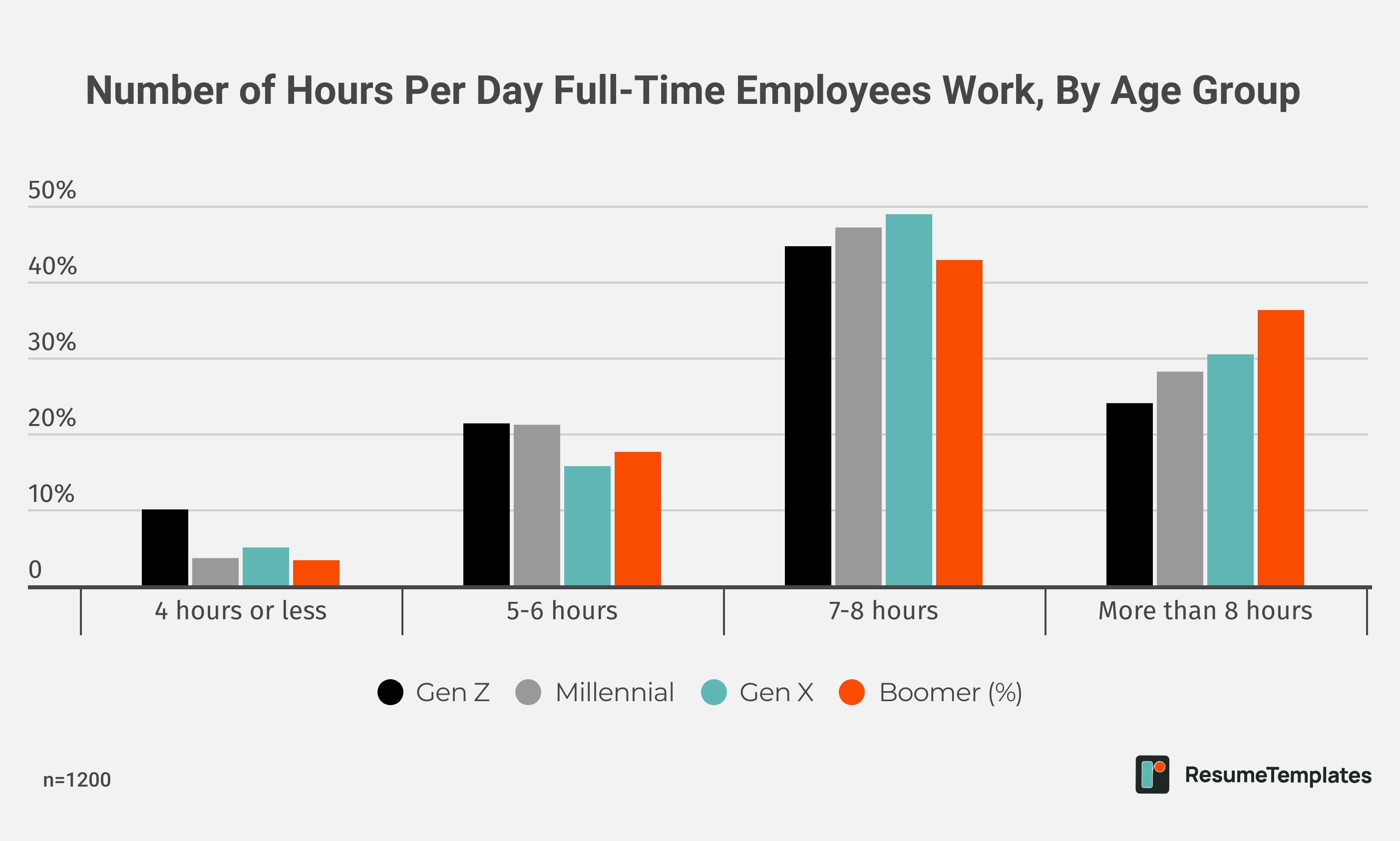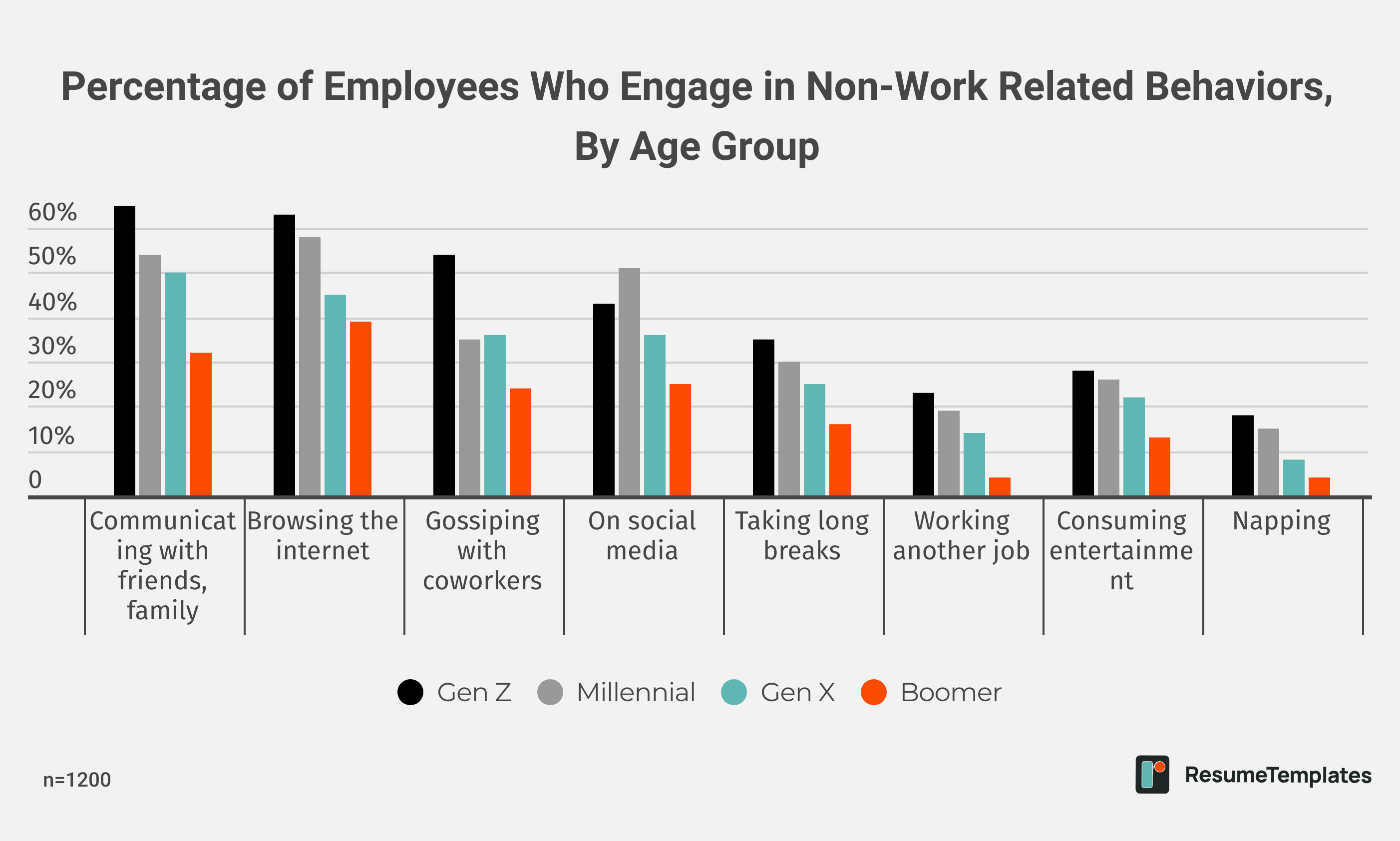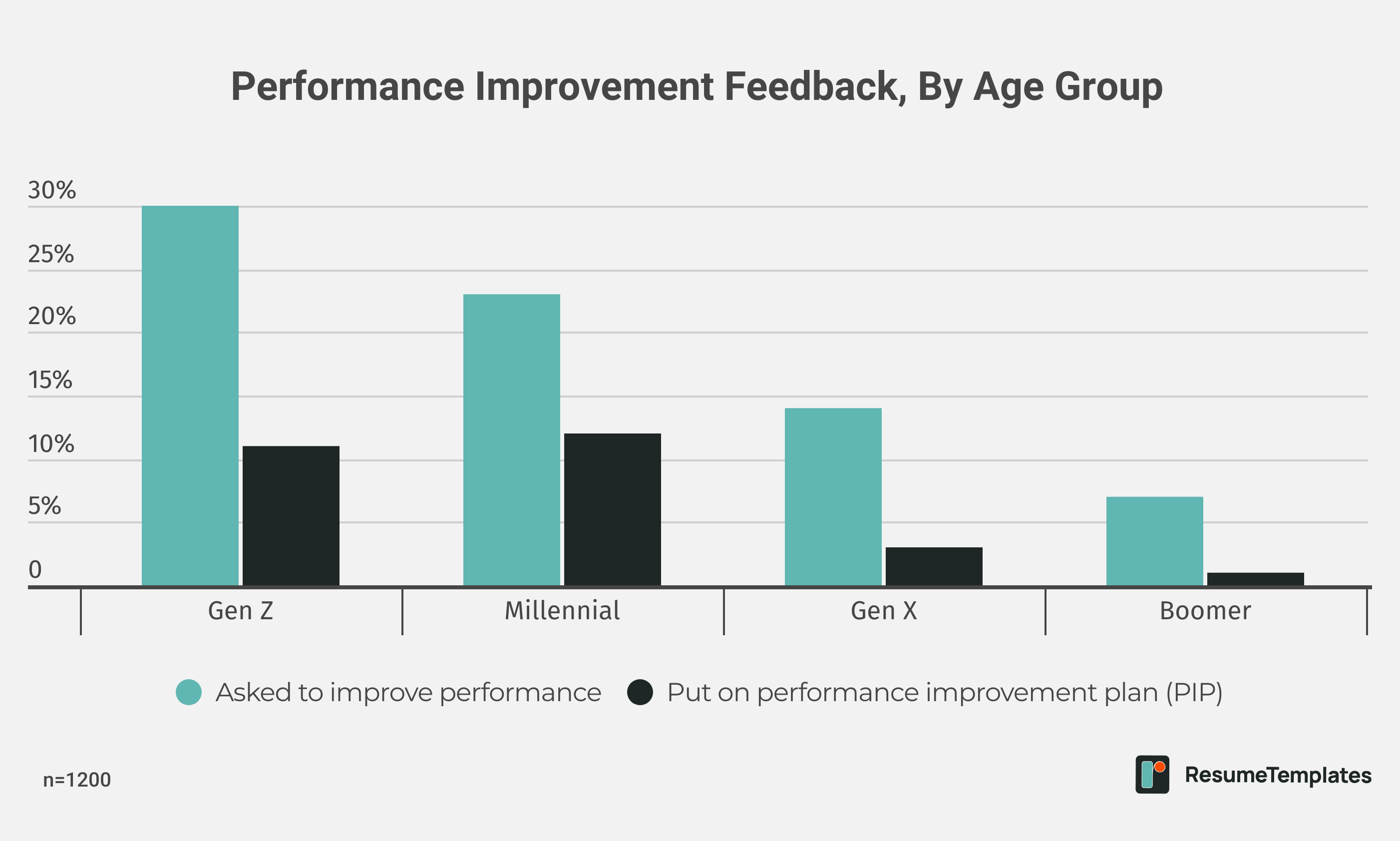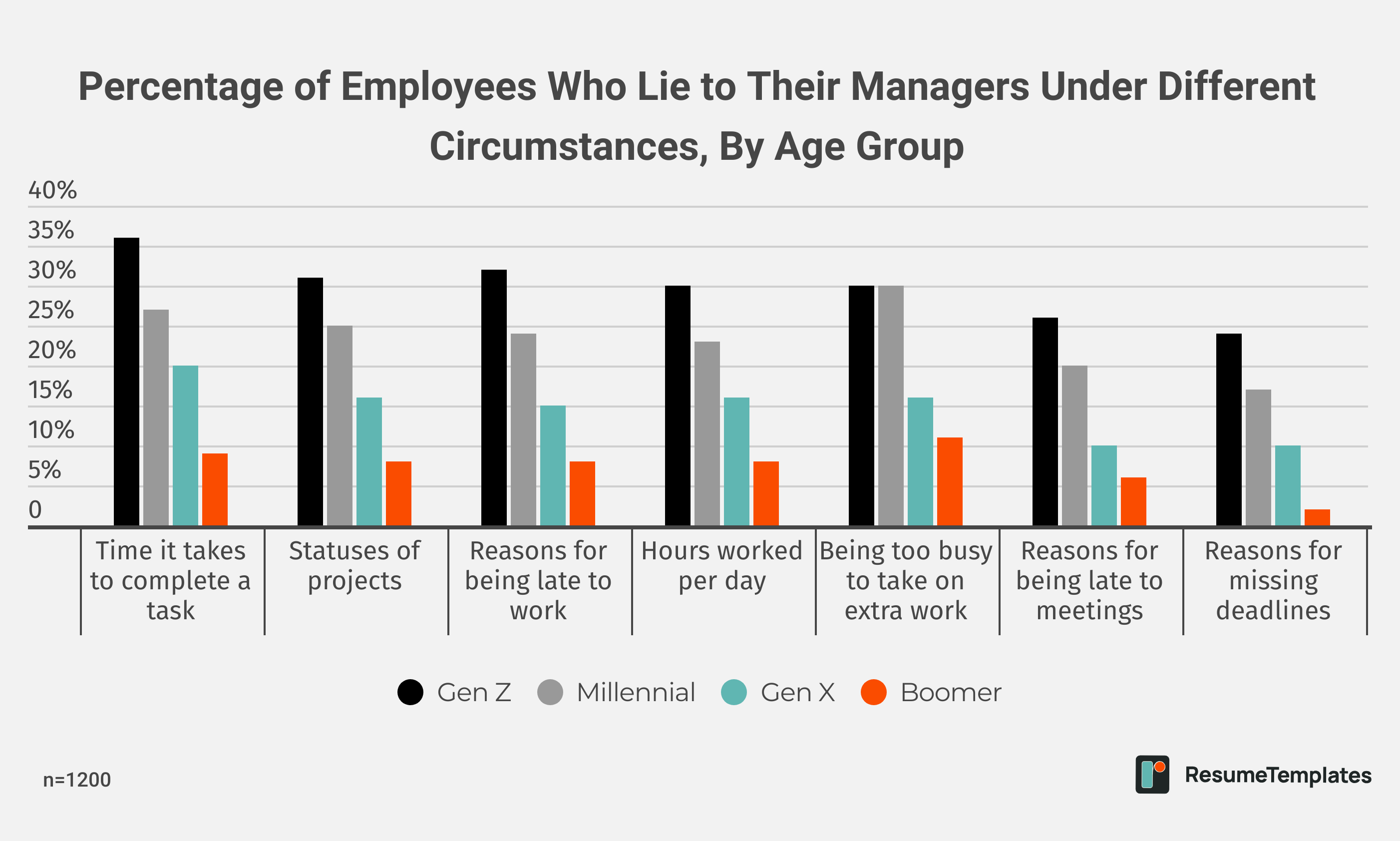Gen Z workers are often perceived as tech-savvy, innovative, and adaptable, bringing fresh perspectives and a strong understanding of digital tools to the workplace. However, they can also be seen as less disciplined, frequently engaging in non-work-related activities during work hours. The group is known for prioritizing work-life balance in ways that sometimes clash with traditional expectations.
ResumeTemplates.com recently surveyed 1,200 workers across generations to understand how Gen Z stacks up. The results indicate Gen Zers tend to work fewer hours, spend more time on non-related work activities, and have performance issues.
Study highlights:
- 1 in 10 full-time Gen Z employees work 4 hours or less per day
- Gen Zers are twice as likely as other generations to not meet expectations at work
- Gen Zers spend more time than other generations on non-work-related activities, such as talking to friends and browsing the internet
- 3 in 10 Gen Zers have been confronted about performance-related issues, and in the past year, 11% were put on a performance improvement plan (PIP)
- Gen Zers are more likely than other generations to lie to their managers about why they’re late, how long projects take them to complete, and more
1 in 10 Full-Time Gen Z Employees Work 4 Hours or Less per Day
The data reveals that Gen Z tends to work fewer hours on average compared to older generations.
Gen Z is the most likely (10%) to work fewer than four hours per day, indicating a notable deviation from other age groups. Four percent of Millennials and 5% of Gen Xers work less than four hours per day. Only 3% of Boomers work fewer than four hours per day.
When it comes to working five to six hours per day, Gen Z and Millennials are similar at 21%, whereas Gen X and Boomers are lower at 16% and 18%, respectively.
The majority of workers in all age groups report working seven to eight hours per day, with Gen Z at 45%, Millennials at 47%, Gen X at 49%, and Boomers at 43%. For those working more than eight hours, Boomers lead with 36%, followed by Gen X at 30%, Millennials at 28%, and Gen Z at 24%.

Gen Zers are most likely to be goofing off at work
The data reveals notable differences in workplace behaviors across age groups. Overall, younger employees are more likely to engage in non-work-related activities during work hours compared to older employees.
Gen Z tends to engage the most in non-work-related activities, with 65% communicating with friends or family and 63% browsing the internet during work. Millennials also show high engagement in these behaviors, with 54% communicating with friends or family and 58% browsing the internet.
Gen X and Boomers generally exhibit lower engagement in such activities, with Gen X showing 50% for communicating with friends or family and 45% for browsing the internet, while Boomers show the lowest engagement at 32% and 39%, respectively.
Gen Zers also gossip with coworkers, take long breaks, do work for other jobs, and nap at higher rates than other generations.
“Younger employees, particularly Generation Z, prioritize work-life balance and mental health, and use technology efficiently, which can create the impression of reduced productivity,” says Andrew Stoner, executive career coach and resume writer at ResumeTemplates.
“Companies can address these dynamics by setting clear productivity metrics, fostering engagement through meaningful assignments, and allowing employees to leverage technology to demonstrate efficiency.”

3 in 10 Gen Zers Have Been Asked By Their Manager To Improve Performance
The data reveals generational differences in the frequency with which people are asked to improve performance and put on a PIP.
Overall, in the past year, 19% of respondents have been told to improve their performance, and 8% have been required to follow a PIP.
Among Gen Z, 30% were asked to improve, with 11% being put on a PIP. Millennials had 23% asked to improve, with 12% placed on a PIP. In comparison, only 14% of Gen X and 7% of Boomers received requests to improve, with 3% and 1% respectively being put on a PIP.
This indicates that younger employees are more frequently asked to improve performance and are more likely to be placed on a PIP compared to older generations.

Gen Zers are twice as likely to not be meeting expectations
Gen Z has the highest percentage of employees not meeting expectations. Of Gen Zers who have had a performance review in the past six months, 5% say they aren’t meeting expectations, compared to 2% for Millennials and Gen X, and 0% for Boomers.
Meeting expectations is fairly consistent across Millennials, Gen X, and Boomers, with each at 43%, while Gen Z is slightly higher at 48%.
Boomers lead in exceeding expectations with 57%, followed by Millennials and Gen X at 55%, and Gen Z at 46%.
“Younger employees may have performance issues due to differences in experience, expectations, and work habits. They often lack experience and are still developing essential skills, while adjusting to the professional environment and its norms.
“High expectations and a focus on work-life balance can lead to stress and disengagement, particularly if company culture and work environments don’t align with their values. Comprehensive onboarding, training/mentorship, clear communication, career development opportunities, and fostering an inclusive culture can help younger employees overcome these challenges and realize their potential,” says Stoner.
Gen Zers Lie to Their Managers Most Frequently
The data reveals notable differences in the frequency of employees lying to their managers across different age groups and circumstances. Gen Z shows the highest tendency to lie, particularly about the amount of time it takes to complete a task (36%) and the status of projects (31%).
Millennials follow closely, with 30% lying about being too busy to take on extra work, matching Gen Z in this category. Gen X employees are dishonest less frequently, with the highest percentage being 20% about the amount of time it takes to complete a task. Boomers exhibit the least tendency to lie, with the highest being 11% about being too busy to take on extra work.
Gen Zers also lie more frequently than other generations about why they are late to work, the number of hours they are working per day, reasons for being late to meetings, and why deadlines are missed.
“Younger employees might be more likely to lie for several reasons. A lack of experience in navigating challenges and a workplace culture that does not promote open communication can lead to this behavior. Additionally, fear of repercussions and the ease of digital communication can contribute to dishonesty. To be proactive, organizations can foster an open and trusting environment, provide support and mentorship, set clear expectations and consequences, and promote ethical leadership,” says Stoner.

This survey was conducted in July 2024. In total, 1,200 U.S. workers were surveyed. To take the full survey, respondents had to answer that they currently work full-time.
Resume Templates offers free, HR approved resume templates to help you create a professional resume in minutes. Choose from several template options and even pre-populate a resume from your profile.